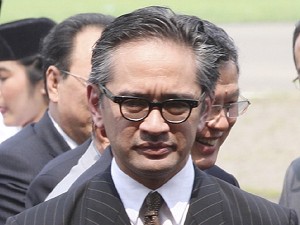Indonesia’s top diplomat on Wednesday embarked on an emergency swing through Southeast Asia in an effort to mend rifts over territorial disputes in the West Philippine Sea (South China Sea) and push for a new accord aimed at preventing rival claims from erupting into armed clashes.
Foreign Minister Marty Natalegawa of Indonesia arrived in Manila early Wednesday morning, met with Foreign Secretary Albert del Rosario, and left five hours later to fly to other Southeast Asian capitals to try to ease the discord and prevent further damage to the Association of Southeast Asian Nations (Asean).
Foreign ministers of the 10-nation bloc failed to issue a concluding joint statement after their annual summit held in Phnom Penh last week when host Cambodia rejected a proposal by the Philippines and Vietnam to mention their separate territorial disputes with China in the statement.
The absence of a postconference statement was unprecedented in the Asean’s 45-year history and underscored the divisions within the regional group over the handling of the West Philippine Sea disputes, which involve four of its members—Brunei, Malaysia, the Philippines and Vietnam. The four, along with China and Taiwan, have been contesting ownership of potentially oil- and gas-rich territories for years and recent spats have raised new tensions and alarm in the region.
Cambodia, a close ally of China, has followed Beijing’s stance that the disputes should not be brought to a multinational forum like Asean but instead should be negotiated by rival claimants one on one.
The Philippines and Vietnam, in contrast, have sought to draw international attention to the disputes, warning that China’s aggression in the West Philippine Sea could potentially block freedom of navigation in the strategic and busy waters, which Beijing claims virtually in their entirety.
Moving forward
Raul Hernandez, spokesperson of the Department of Foreign Affairs (DFA), said Natalegawa and Del Rosario discussed the problem to see “how to move forward after what happened in Phnom Penh” last week.
Hernandez said the two foreign ministers agreed on key principles that would reinforce and strengthen the Asean as an organization.
“I think all of us have gone on record in expressing our regret and disappointment even, that Asean was not able to come to a consensus on the South China Sea issue,” Natalegawa said at a press briefing at Ninoy Aquino International Airport prior to his departure. “But the question that’s begging [for an answer] is what’s next.”
Natalegawa said Asean must move forward. “I got the sense that Secretary del Rosario also shared the view that the Asean must continue to maintain cohesion, unity in addressing the issue of the South China Sea,” he said.
Natalegawa said he and Del Rosario agreed to propose to Asean a number of key principles for dealing with West Philippine Sea disputes:
- The full implementation of the Declaration of Conduct (DOC) of Parties in the South China Sea.
- Full support for the guidelines of the DOC.
- The need for an early conclusion of the Regional Code of Conduct in the South China Sea.
- Full respect for the universally recognized principles of international law, including the 1982 UN Law of the Sea.
- The continued exercise of self-restraint and nonuse of force.
- The peaceful resolution of conflicts in accordance with universally recognized principles of international law, including the UN Convention on the Law of the Sea.
No more communiqué
Asked if a joint statement could still be issued, Natalegawa said: “That’s why I’m identifying the core principles of the Asean on the South China Sea issue and then hopefully to have this issue pronounced by the Asean chair. The joint communiqué is now behind us. I think we are just moving forward in wanting to ensure that whatever transpired or did not transpire in Phnom Penh does not have any inimical or unintended consequence.”
Natalegawa added: “That is why it is critically important for us now to act quickly and regroup, reestablish and restore the sense of Asean unity. I don’t believe we have disunity within Asean on the South China Sea issue. There was certainly no consensus but in so far as core issues are involved, there remains an Asean consensus.”
Natalegawa said he would not pronounce Asean an organization in disarray and disunited.
“I don’t think that’s the case,” he said. “The Asean is quite mature, able and willing to confront even the most difficult of issues. And when we fail to reach a consensus, we learn lessons from it. We cannot let this issue affect us in a negative way.”
Region’s future
Also Wednesday, Asean Deputy Secretary General Bagas Hapsoro said all in Asean must remember that the region’s future lay in Asean’s own hands.
Speaking at a forum attended by officers of the Indonesian armed forces, Bagas, an Indonesian, stressed the importance of coordination among Asean members.
“We must be able to solve the problem without becoming a test case for bigger powers, and hence regional centrality is essential,” Bagas said.
Referring to the tensions in the West Philippine Sea between China and the Philippines, Bagas said that there was a solution to any problem as long as Asean members kept coordinating closely with all the parties involved.
China lauds Asean
China lauded the Asean foreign ministers’ meeting despite its failure to issue a joint communiqué on handling disputes in the West Philippine Sea.
In a statement posted on the website of the Chinese Embassy in Manila, foreign ministry spokesperson Hong Lei said that despite the failure to issue a communiqué, Asean members reached some “broad consensus” for the Asean community. With reports from Ronnel W. Domingo and AP


